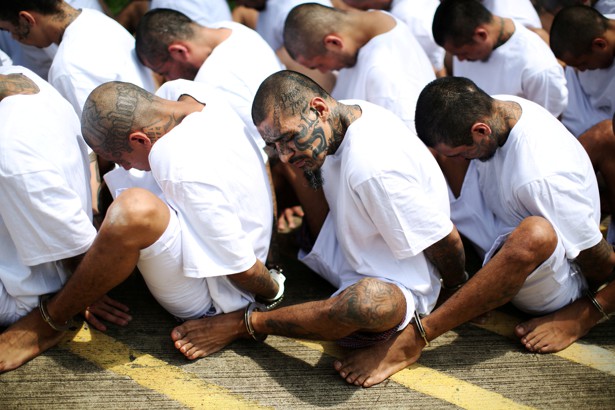Even Trump critics should support his crackdown on bloodthirsty killers who prey mostly on Hispanic immigrants.
By Rich Lowry
January 3, 2018

Jose Cabezas / Reuters
Donald Trump is given to lurid rhetoric, and in the MS-13 gang he has finally met a subject beyond his ability to exaggerate.
He calls members of the largely Salvadoran gang “animals.” He charges them with “spreading gruesome bloodshed.” He says that “they kidnap, they extort, they rape, and they rob, they prey on children.” And, finally, he insists that “they shouldn’t be here.”
He’s right on every count. If there is any aspect of the Trump immigration agenda that should command universal support, it is his crackdown on an immigrant gang whose motto is “murder, rape, and control,” and whose signature weapon is the machete.
Yet the Trump administration’s focus on MS-13 has occasioned criticism from the usual quarters, for the usual reasons. A piece in the Boston Globe objected to the administration’s blaming crime on “highly organized gangs of immigrants.” Well, what if a highly organized gang of immigrants is indeed responsible for its own crime wave?
Philip Bump of the Washington Post objected to Trump’s speaking, at an Ohio rally, of the brutal stabbing death of a teenage girl at the hands of MS-13. It was a “graphic depiction of Hispanic immigrants in the United States,” Bump wrote, as “violent, bloodthirsty animals.” As it happens, MS-13 are, indeed, bloodthirsty, and they are Hispanic immigrants.
Jamelle Bouie of Slate accused the president of undertaking “a political plan to demagogue Hispanic immigrants as imminent threats to white Americans, and white women in particular.”
This has it backward. The chances of a white person getting extorted, assaulted, or killed by MS-13 are vanishingly small compared with the chances of poor Hispanic immigrants who live and work in the communities blighted by the gang.
As Jessica Vaughan and Jon Feere noted in a report for the restrictionist Center for Immigration Studies, a surge of more than 2 million immigrants came to the United States from Central America during the 1980s and 1990s, most settling in Los Angeles, most illegal immigrants. Nurtured on violence in the guerrilla wars of Central America, members of the incipient MS-13 were well prepared to fight it out in the worst gang-ridden neighborhoods in the city.
Law enforcement substantially disrupted the gang in the United States during the 2000s, but it has made a comeback. The gang’s leaders in El Salvador professionalized its U.S. operations. And the flow of so-called unaccompanied children from Central America across the southern border has replenished the gang’s ranks; MS-13 members have been among the migrants, and the influx of non-English-speaking young males with no connections to the U.S. provides a ready base of recruitment.
This has led to horrifying headlines in places across the U.S. with large Central American populations, from Long Island to Houston to the Washington, D.C., area.
In a lengthy report on Langley Park, Md., the Washington Post detailed the depredations of MS-13 “seven miles from the White House.” According to the Post, “it took Abigail Bautista less than a month of living in Langley Park to learn that her new neighborhood in Maryland had its own set of laws, written not in statutes but in gang graffiti and blood.”
Needless to say, Bautista is not a white woman. She’s an illegal immigrant and mother of five, whose street vending business made her a prime target for extortion by the gang. The tragedy of immigrants in places like Langley Park is that they encounter in the U.S. exactly the breakdown in civil society and lack of rule of law that they thought they were escaping in Central America.
It will only stop if we continue the newly invigorated campaign against MS-13 members and get a better handle on migrants coming here from Central America. The commentators tsk-tsking Trump’s focus on MS-13 surely don’t, by and large, live in neighborhood dominated by savage gangs. Why should anyone else?
— Rich Lowry is the editor of National Review. He can be reached via email: comments.lowry@nationalreview.com. Copyright © 2018 King Features Syndicate
No comments:
Post a Comment